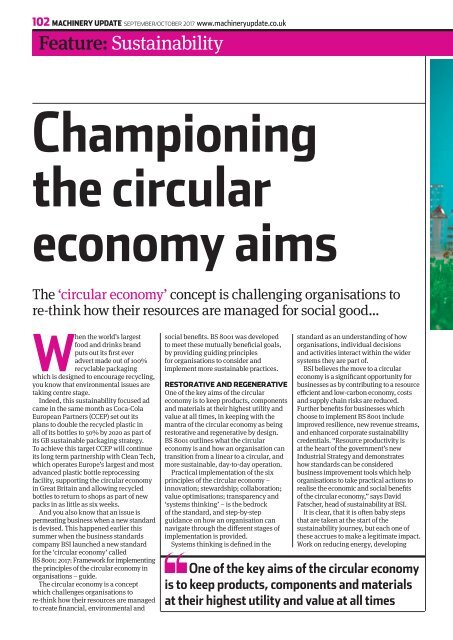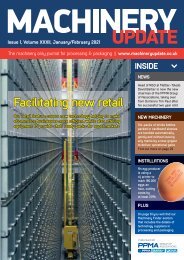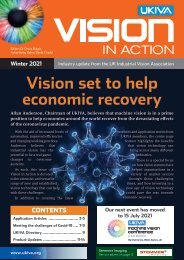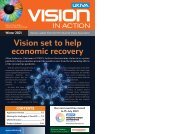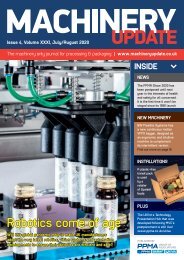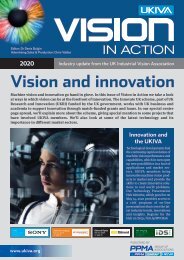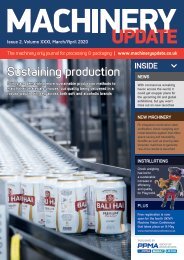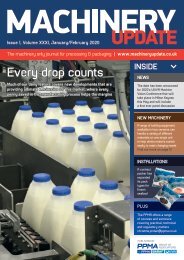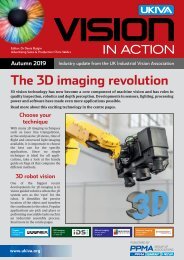Machinery Update September \ October 2017
Machinery Update September \ October 2017 - PPMA Show Preview
Machinery Update September \ October 2017 - PPMA Show Preview
Create successful ePaper yourself
Turn your PDF publications into a flip-book with our unique Google optimized e-Paper software.
102 MACHINERY UPDATE SEPTEMBER/OCTOBER <strong>2017</strong> www.machineryupdate.co.uk<br />
Feature: Sustainability<br />
Championing<br />
the circular<br />
economy aims<br />
The ‘circular economy’ concept is challenging organisations to<br />
re-think how their resources are managed for social good…<br />
W<br />
hen the world’s largest<br />
food and drinks brand<br />
puts out its first ever<br />
advert made out of 100%<br />
recyclable packaging<br />
which is designed to encourage recycling,<br />
you know that environmental issues are<br />
taking centre stage.<br />
Indeed, this sustainability focused ad<br />
came in the same month as Coca-Cola<br />
European Partners (CCEP) set out its<br />
plans to double the recycled plastic in<br />
all of its bottles to 50% by 2020 as part of<br />
its GB sustainable packaging strategy.<br />
To achieve this target CCEP will continue<br />
its long term partnership with Clean Tech,<br />
which operates Europe’s largest and most<br />
advanced plastic bottle reprocessing<br />
facility, supporting the circular economy<br />
in Great Britain and allowing recycled<br />
bottles to return to shops as part of new<br />
packs in as little as six weeks.<br />
And you also know that an issue is<br />
permeating business when a new standard<br />
is devised. This happened earlier this<br />
summer when the business standards<br />
company BSI launched a new standard<br />
for the ‘circular economy’ called<br />
BS 8001: <strong>2017</strong>: Framework for implementing<br />
the principles of the circular economy in<br />
organisations – guide.<br />
The circular economy is a concept<br />
which challenges organisations to<br />
re-think how their resources are managed<br />
to create financial, environmental and<br />
social benefits. BS 8001 was developed<br />
to meet these mutually beneficial goals,<br />
by providing guiding principles<br />
for organisations to consider and<br />
implement more sustainable practices.<br />
RESTORATIVE AND REGENERATIVE<br />
One of the key aims of the circular<br />
economy is to keep products, components<br />
and materials at their highest utility and<br />
value at all times, in keeping with the<br />
mantra of the circular economy as being<br />
restorative and regenerative by design.<br />
BS 8001 outlines what the circular<br />
economy is and how an organisation can<br />
transition from a linear to a circular, and<br />
more sustainable, day-to-day operation.<br />
Practical implementation of the six<br />
principles of the circular economy –<br />
innovation; stewardship; collaboration;<br />
value optimisations; transparency and<br />
‘systems thinking’ – is the bedrock<br />
of the standard, and step-by-step<br />
guidance on how an organisation can<br />
navigate through the different stages of<br />
implementation is provided.<br />
Systems thinking is defined in the<br />
standard as an understanding of how<br />
organisations, individual decisions<br />
and activities interact within the wider<br />
systems they are part of.<br />
BSI believes the move to a circular<br />
economy is a significant opportunity for<br />
businesses as by contributing to a resource<br />
efficient and low-carbon economy, costs<br />
and supply chain risks are reduced.<br />
Further benefits for businesses which<br />
choose to implement BS 8001 include<br />
improved resilience, new revenue streams,<br />
and enhanced corporate sustainability<br />
credentials. “Resource productivity is<br />
at the heart of the government’s new<br />
Industrial Strategy and demonstrates<br />
how standards can be considered<br />
business improvement tools which help<br />
organisations to take practical actions to<br />
realise the economic and social benefits<br />
of the circular economy,” says David<br />
Fatscher, head of sustainability at BSI.<br />
It is clear, that it is often baby steps<br />
that are taken at the start of the<br />
sustainability journey, but each one of<br />
these accrues to make a legitimate impact.<br />
Work on reducing energy, developing<br />
One of the key aims of the circular economy<br />
is to keep products, components and materials<br />
at their highest utility and value at all times


